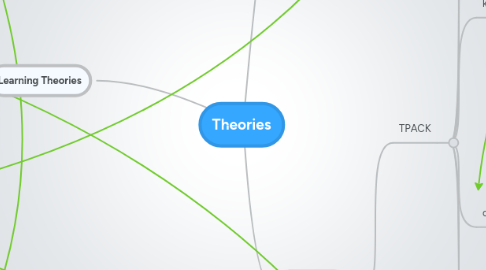
1. Learning Theories
1.1. Constructivism
1.1.1. Basis
1.1.1.1. occurs through experience and reflection
1.1.1.2. active participant and collaboration
1.1.1.3. learners apply their own knowledge and take control
1.1.2. Implication on Education
1.1.2.1. teachers help guide students
1.1.2.2. students are faced with problems and forced to come up with their own answers based on their experience
1.2. Cognitive Load
1.2.1. Basis
1.2.1.1. relies on short term memory, long term recall
1.2.1.2. knowledge input
1.2.1.3. understanding the process
1.2.1.4. learning occurs when there is enough information that the environment is not boring, but not so much that the environment is over-whelming
1.2.2. Implications on Education
1.2.2.1. learning is organized in a way that people can memorize it
1.2.2.1.1. chunking information together
1.2.2.1.2. repetition
1.2.2.1.3. straight forward and simplified versions
1.3. Connectivism
1.3.1. Basis
1.3.1.1. there is always new information and this information is always evolving
1.3.1.2. reflects the social environment
1.3.1.3. requires an attitude and actions from the learner
1.3.1.4. learning is a process, it requires continuous thought and nurturing
1.3.1.5. requires the connection of information
1.3.1.6. looking at the bigger picture
1.3.2. Implication on Education
1.3.2.1. students are on going learners
1.3.2.2. must be able to make connections
1.3.2.3. opinions are encouraged and required
1.3.2.4. utilizing tools (technology, etc.)
1.4. Behaviourism
1.4.1. Basis
1.4.1.1. memory with association (environment and the mind)
1.4.1.2. positive and negative consequences shape behaviour
1.4.1.3. the mind cannot be observed at work
1.4.2. Implications on Education
1.4.2.1. positive and negative reinforcement and consequences are used to shape students
1.4.2.2. students learn by wanting to avoid the negative and wanting to experience the positive
2. Technology Theories
2.1. SCOT
2.1.1. Social Construction Of Technology
2.1.1.1. Basis
2.1.1.1.1. humans shape technology
2.1.1.1.2. requires the ability to understand technology in its social context
2.1.1.1.3. people determine the success of technology
2.1.1.2. Implications on Education
2.1.1.2.1. more popular piece of technology may be used in the classroom, instead of the one that could be more affective
2.2. Media Ecology
2.2.1. Basis
2.2.1.1. study of media environments
2.2.1.2. how information and communication play into affairs
2.2.1.2.1. how this affects people in the way of communication, perception, understanding, feelings and values
2.2.1.3. implicates itself onto humans
2.2.2. Implication on Education
2.2.2.1. media affects the way people think, and therefore will effect learners as well
2.2.2.2. shape the way people think and their opinions
3. Frameworks
3.1. TPACK
3.1.1. Technological Pedagogical Content Knowledge
3.1.2. Mishra, P., & Koehler, M.J.
3.1.2.1. creators of TPACK
3.1.2.2. thought that everything must work together
3.1.3. consists of three main forms of knowledge
3.1.3.1. Content
3.1.3.1.1. the subjects that you teach
3.1.3.1.2. providing all the information for students to complete a task
3.1.3.2. Pedagogy
3.1.3.2.1. the art/science of teaching
3.1.3.2.2. are the tasks suited for the students
3.1.3.3. Technology
3.1.3.3.1. resources used to teach
3.1.4. three primary forms of knowledge work together
3.1.5. connections between the main forms
3.1.5.1. Pedagogical Content Knowledge
3.1.5.1.1. pedagogy strategies appropriate for that type of activity
3.1.5.1.2. must be comfortable with the method that is appropriate for teaching that task
3.1.5.2. Technological Content Knowledge
3.1.5.2.1. technology can influence content
3.1.5.2.2. ways to brings technology into the classroom to teach new content
3.1.5.3. Technological Pedagogical Knowledge
3.1.5.3.1. technology that affects how we teach
3.1.5.3.2. new ways of teaching using technology
3.1.5.3.3. choosing the right tool to teach that subject
3.1.5.4. Technological Pedagogical Content Knowledge (connection between all three)
3.1.5.4.1. center
3.1.5.4.2. the balance between all the primary areas
3.1.6. reflects the requirements needed to teach technology
3.1.7. based on the TPACK Image
3.1.8. context
3.1.8.1. do you have the proper resources?
3.1.8.2. this impacts how the three primary areas work and work together
3.2. Philosophy of Teachnology
3.2.1. teachers should utilize technology as much as possible
3.2.2. its preparing students for the world
3.2.3. teaching students how to properly use the internet
3.2.3.1. netetiquette
3.2.3.2. digital footprint
3.2.3.3. defeating cyber bullying
3.2.4. encourages collaboration and communication,which supports critical thinking
3.2.5. evolution and continually growing
3.2.6. views on how technology should be integrated into the classroom
